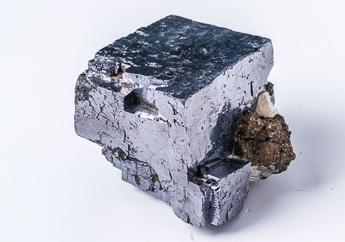Missouri Geological Survey Director: Carey Bridges, RG

With vivid memories of the Conquistadores and the riches of Peru, the French formed “The Company of the West” in 1717 to explore and exploit the mineral wealth of the vast Mississippi River basin of which Missouri was to become a part. Two years later the company appointed M. Philip Francis Renault, the son of an iron founder, to the post of Director General of Mines. In 1720, he brought to the new area M. de la Motte Cadillac, a man reported to be versed in mineralogy. On one of their journeys, lead ore was discovered near the now-famous landmark of Mine La Motte near Fredericktown in Madison County.
After a slow beginning in the mining and smelting of lead ores, Missouri became the nation’s number one producer of lead in 1907. It has remained in that position ever since except for the year 1962 when a strike curtailed output in the state. Most early production came from the Old Lead Belt district of southeast Missouri in the Flat River-Bonne Terre area and the Tri-State Zinc-Lead district in southwest Missouri around Joplin.
Galena is the principal lead ore mineral. It is lead sulfide (PbS). When pure, it contains 86.6% lead and 13.4% sulfur. Galena is metallic lead gray with a bright metallic luster when freshly broken, and dark gray to black when weathered. It is brittle and very heavy (about 7.6 times as heavy as water). Galena most commonly forms cubic crystals, and breaks with perfect cubic cleavage.
Today, all of Missouri’s lead production comes from the Viburnum Trend district, a very narrow, 35-mile-long ore district extending southward from the small town of Viburnum, Iron County, in southeast Missouri. In 1992, nine Missouri mines produced a total of 330,000 tons of lead (75% of the U.S. total) valued at more than $230 million. The tremendous Viburnum Trend deposits virtually guarantee that our state will be a leading producer of lead for years to come.

Since 1720 galena has played an important role in the history and economics of Missouri. Thus, it was most fitting that in 1967 the 74th Missouri General Assembly designated GALENA the official mineral of the State of Missouri. Lead is useful because it is soft, dense, and workable, melts at a relatively low temperature, and bonds readily with other metals. It was once extensively used in piping and other plumbing fixtures, including the solder formerly used to connect copper pipes. Our word “plumbing” in fact, derives from the Latin “plumbum,” the Roman word for lead.
Visit the department’s Ed Clark Museum of Missouri Geology, where you will find galena on display.
Nothing in this document may be used to implement any enforcement action or levy any penalty unless promulgated by rule under chapter 536 or authorized by statute.
For more information
Geological Survey Program
Missouri Geological Survey
P.O. Box 250
Rolla, MO 65402-0250
United States
